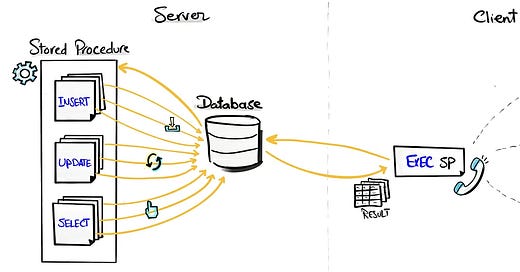SQL Stored Procedure vs Python?
SQL Stored Procedures Explained, Stored Procedures vs. Python: The Pros, Cons, and My Take.
Hey friends! 👋
Happy Wednesday! Today, I’d like to talk about SQL Stored Procedures, why we need them, and how they differ from using Python.
Let’s Go!
What is Stored Procedure
A stored procedure is a precompiled collection of SQL statements stored in the database. Think of it like a function in programming but designed specifically to interact with your database.
Instead of sending individual SQL queries from an application, you execute these predefined procedures. They can handle repetitive tasks such as inserting, updating, or selecting data. Stored procedures are saved in the database, ready to be executed anytime by calling their name.
Why Use Stored Procedure?
Faster: Precompiled for speed—no need to reprocess queries every time.
Secure: Users can run them without direct table access.
Easier to Manage: Keeps all your database logic in one place.
Consistent: Ensures the same behavior across your app.
Stored Procedures Vs. Simple Query
Query:
One-time SQL request for data or updates.
Simple and great for quick, ad-hoc tasks.
Slower: Processed fresh every time.
Stored Procedure:
Reusable, precompiled block of SQL stored in the database.
Faster: Already optimized by the database.
Secure and consistent for repetitive tasks.
SQL Stored Procedures Vs. Python Code
Performance: Stored procedures are faster because they’re precompiled. Python executes SQL queries dynamically.
Flexibility: Python wins here. It integrates with APIs, handles advanced logic, and works with multiple databases.
Version Control: Python code fits neatly into versioning tools like Git. Stored procedures? Not so much.
Maintenance: Changing a stored procedure requires messing with the database. Updating Python code? Way easier with modern tools.
Complex Logic: Python is perfect for handling anything beyond basic database tasks, thanks to its libraries and ecosystem.
Wrapping Up
Stored procedures are fast and secure for database-heavy tasks but are limited in flexibility.
Python provides endless possibilities for custom workflows but trades some speed for flexibility.
In my projects, I rely heavily on Python mixed with SQL to solve big, complex tasks. Python’s flexibility lets me build logic, integrate APIs, and handle multiple systems seamlessly—all in one place.
Because of this, I tend to avoid stored procedures when possible. They feel restrictive and harder to manage, especially compared to Python’s ease of versioning and maintenance with Git.
That said, Python + SQL gives me the perfect balance of power and control.
I hope you found this helpful, and if you have any questions or want to share your own tips, I’m all ears! Happy querying!
Baraa
Hey friends —
I’m Baraa. I’m an IT professional and YouTuber.
My mission is to share the knowledge I’ve gained over the years and to make working with data easier, fun, and accessible to everyone through courses that are free, simple, and easy!







